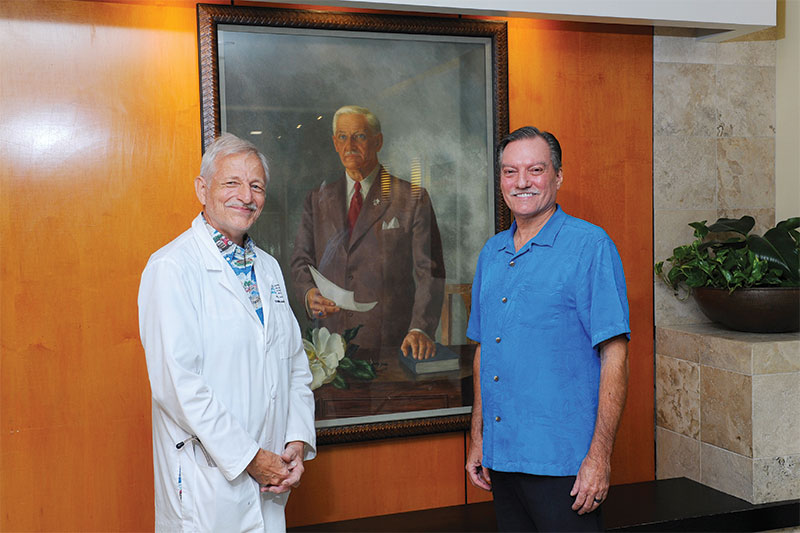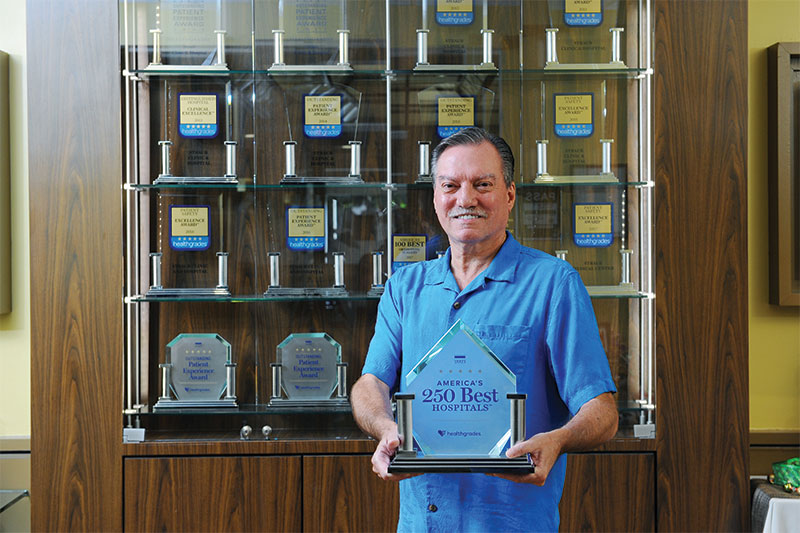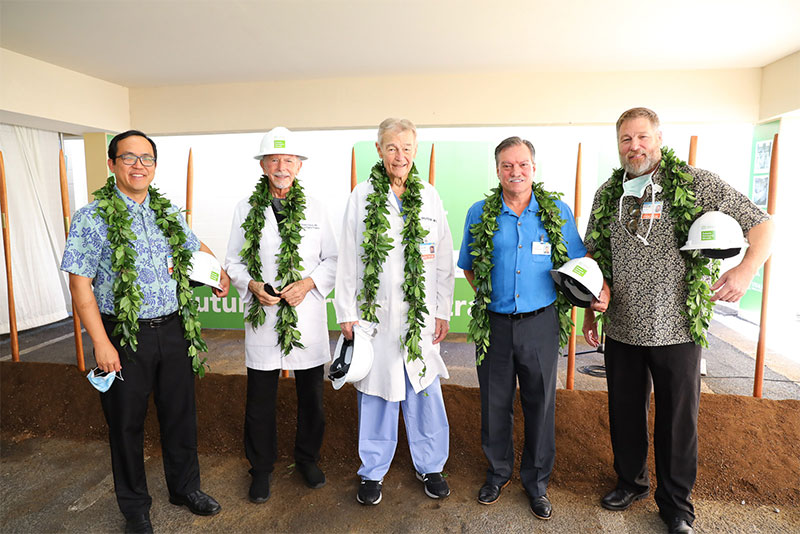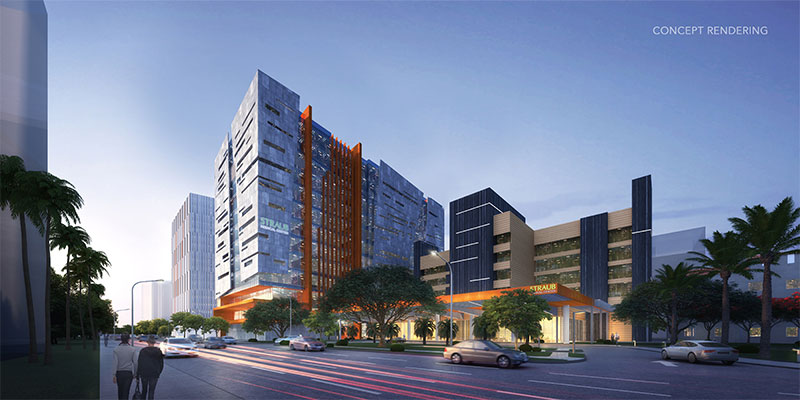Following in Dr. Straub’s Footsteps

Dr. Stephen Arnold, an internist at Straub Medical Center since 1978, poses with Art Gladstone, executive vice president and chief strategy officer of Hawai‘i Pacific Health, in front of a portrait of Dr. George F. Straub, the medical center’s founding physician.
With their founder’s vision in mind, Art Gladstone and others at Straub Medical Center walk confidently toward the next century of health care excellence.
After celebrating its centennial anniversary this past year, Straub Medical Center is now squarely poised to transform health care for posterity.
On Dec. 13, Straub Medical Center held a groundbreaking to officially unveil an expansive redevelopment project for its existing campus, providing patients with everything needed to cover all the bases of their well-being. Straub’s new site will be almost triple the current facility’s size at 760,000 square feet and will consist of a multiyear effort. It will also be the biggest endeavor of its kind yet by parent company Hawai‘i Pacific Health. This is expected to be a 15-year project and it will be constructed in multiple phases.
“This is more than a rebuilding of the Straub Medical Center,” says Art Gladstone, executive vice president and chief strategy officer for Hawai‘i Pacific Health. “This redevelopment is about building a health care campus of the future, which will progressively address the medical needs of future generations. We are looking to create a space with the tools and resources necessary to impact all aspects of patient health — prevention, treatment, access and affordability.

Gladstone carries the Healthgrades America’s 250 Best Hospitals Award for 2021, which was received by Straub Medical Center.
“The groundbreaking for Straub’s health care campus of the future was a way for us to celebrate this historic milestone and honor the work by our physicians, nurses, staff and board volunteers, who have positioned us well for the next century of quality health care,” he adds. “The Straub redevelopment reflects our vision for the future of health care. We are in the design phase for the first phase of this project, which is the parking structure. Demolition for this phase will begin in 2022. The new parking structure will have 1,650 stalls, replacing the existing 400-stall parking garage.”
The future campus will include a new medical center building that is more spacious and flexible, with larger patient and operating rooms, as well as additional space for the emergency department. It will also feature a renovation of the current Straub Medical Center and Strode Medical Building, which was designed by acclaimed architect Charles W. Dickey.

Dr. Les Chun, chief executive officer of Hawai‘i Pacific Health Medical Group; Dr. Bob Schulz, Straub physician and Redevelopment Campaign Committee member; Dr. John Balfour, Straub physician; Art Gladstone, executive vice president and chief strategy officer, Hawai‘i Pacific Health; and Dr. Ed Weldon, Straub physician and foundation board member participate in the recent groundbreaking for the new Straub Medical Center. PHOTO COURTESY HAWAI‘I PACIFIC HEALTH
“Since this is a long-term project, there is still a lot of planning ahead. Our vision is a health care campus that provides us flexibility, since the pandemic has taught us that we need to be nimble and adapt to unforeseen circumstances. For example, the new parking structure has the capability for six of its floors to be converted for clinical services, if the need arises. All of our planning is about putting patients’ needs first,” Gladstone elaborates. “Straub has a stellar reputation and we wanted to ensure that it retained that standing by moving forward with an aggressive, state-ofthe-art redevelopment that will serve the health care needs of the people of Hawai‘i for the next 100 years.”
Gladstone notes that Straub thoughtfully and diligently acquired either via purchase or long-term ground lease the several properties that make up the new city-block campus, which is bordered by South King, South Hotel and Kealamakai streets, and Ward Avenue. The first purchased property on this city-block dates back to 1926 and acquisitions for the campus continued into 2021.
Many groups of people are credited with bringing this project to fruition, according to Gladstone. Aside from obtaining a certificate of need from the State Health Planning and Development Agency of the Hawai‘i Department of Health, the medical center also received unanimous approval from the Honolulu City Council.
“We take the historical significance of the land that surrounds this project seriously and worked closely with the necessary groups and individuals. The entire health care campus, which is more than five acres, falls within the Thomas Square/Honolulu Academy of Arts Special Design District,” Gladstone explains.
“We’ve made ongoing communications with the neighborhood boards and area residents a priority. We are grateful to the kama‘āina families that agreed to either sell or lease their land parcels to us and their recognition of the importance of the redevelopment of Straub.”
Straub Medical Center has a long and storied history in Hawai‘i. Its founding physician, Dr. George F. Straub, even attended to the medical needs of Queen Lili‘uokalani. He arrived in the islands from Germany and conceived the idea of forming a group of physicians into a practice in order to provide better, more specialized care for his patients.
Dr. Straub was also known for his preference for wearing wooden shoes in the operating room.
“His quote is one that resonates with all of us still today — ‘I had a vision that we could create a clinic where patients always come first and where the health needs of the entire family could be met under one roof,’” Gladstone declares.
“Straub Medical Center has made Dr. Straub’s vision its guiding principle since its founding. Dr. Straub recognized that being isolated in the middle of the Pacific Ocean did not have to limit health care. His solution was to establish Hawai‘i’s first specialized medical clinic,” Gladstone adds. “This redeveloped health care campus will continue to create more opportunities for patients to stay in Hawai‘i for all the care they need with Straub’s state-of-the-art facilities and advanced technology.”
In 1921, Dr. Straub and his early partners formed The Clinic, with a new concept of group practice that would bring together specialists to provide the finest expert care available in the islands. By 1933, The Clinic moved to its current location and had nine doctors and a staff of 14. By 1973, it became Straub Clinic & Hospital after expanding to a building with 159 private rooms and a 24-hour emergency outpatient facility. In the hospital’s first decade of care, the staff grew from 228 to 480. Today, Straub still operates out of that same building, but now has more than 500 physicians and 1,700 employees.
Straub and Hawai‘i Pacific Health have a plethora of achievements. For example, Gladstone notes that Straub has the only burn center in the state, which opened in 1983 and continues to treat more than 100 patients a year.
Gladstone is also exceedingly proud of the people who work there.
“As an organization, we want to be a workplace of choice. We were honored in August 2021 by Forbes as the best employer in Hawai‘i, according to a nationwide ranking of “America’s Best Employers” by state,” he says.
Gladstone shares that Straub’s sports medicine physicians and orthopedic surgeons are recognized as among some of the best in the nation, and have performed many medical firsts in the state. Meanwhile, the center’s physicians are also acclaimed for their expertise in cardiovascular care.
One accolade in particular stands out in Gladstone’s mind.
“Personally, I’m most proud of Straub Medical Center being the only hospital in Hawai‘i to receive the Healthgrades America’s 250 Best Hospitals Award two years in a row in 2020 and 2021, as well as finishing in the top 5% nationally in clinical excellence. The reason it means so much to me is because our patients are the ones who deemed Straub worthy of this award,” Gladstone emphasizes.
A native of Canada, the 57-year-old Gladstone has filled the roles of executive vice president and chief strategy officer with Hawai‘i Pacific Health since January 2020. He previously served as chief executive officer of Pali Momi and Straub, and chief nurse executive for Hawai‘i Pacific Health. He began his career with Hawai‘i Pacific Health in 1990 as a registered nurse at Pali Momi and through the years, has been promoted within the organization to a variety of positions.
“I always had very good mentors along the way … And one of the things I really enjoy in my current role is being a mentor to some of our younger leaders,” Gladstone shares.
He holds a bachelor’s degree in nursing, a master’s degree in business administration and is a fellow of the American College of Health-care Executives. An active member in the community, he is on a number of boards such as Hawai‘i Pacific University trustees and is currently chair of the board of directors for the Healthcare Association of Hawai‘i. Gladstone enjoys serving locally in a variety of ways to help educate and develop future leaders. For example, he’s a huge college basketball fan and has been a University of Hawai‘i at Mānoa season ticket holder since 1991. He’s even been the team’s booster club president for the past four years.
“The reason I do that is because I love the sport. But more importantly, I love to support a program that is very well run,” he explains. “The coaching staff and the people involved with the program are really stellar individuals who really see their goal in life of helping young men to achieve the best they can achieve on the court, but more importantly, off the court.”
Gladstone and wife Michelle have three children: son Keegan, and two daughters, Jenessa and Leia. The family’s relocation to the islands came about after a happy coincidence.
“I was finishing my nursing degree (in Canada). I was at the college library flipping through a nursing journal and I came upon an advertisement that read ‘Canadian nurses come to Hawai‘i,’” Gladstone recalls.
He found work locally in the medical field, and he reminisces that he’s pleased with his life’s journey.
“The career opportunities and the support from the organization has always kept us here. I’m very grateful that I’ve had the opportunities within the organization, as well as being able to raise my family in a beautiful state like Hawai‘i,” he says.






